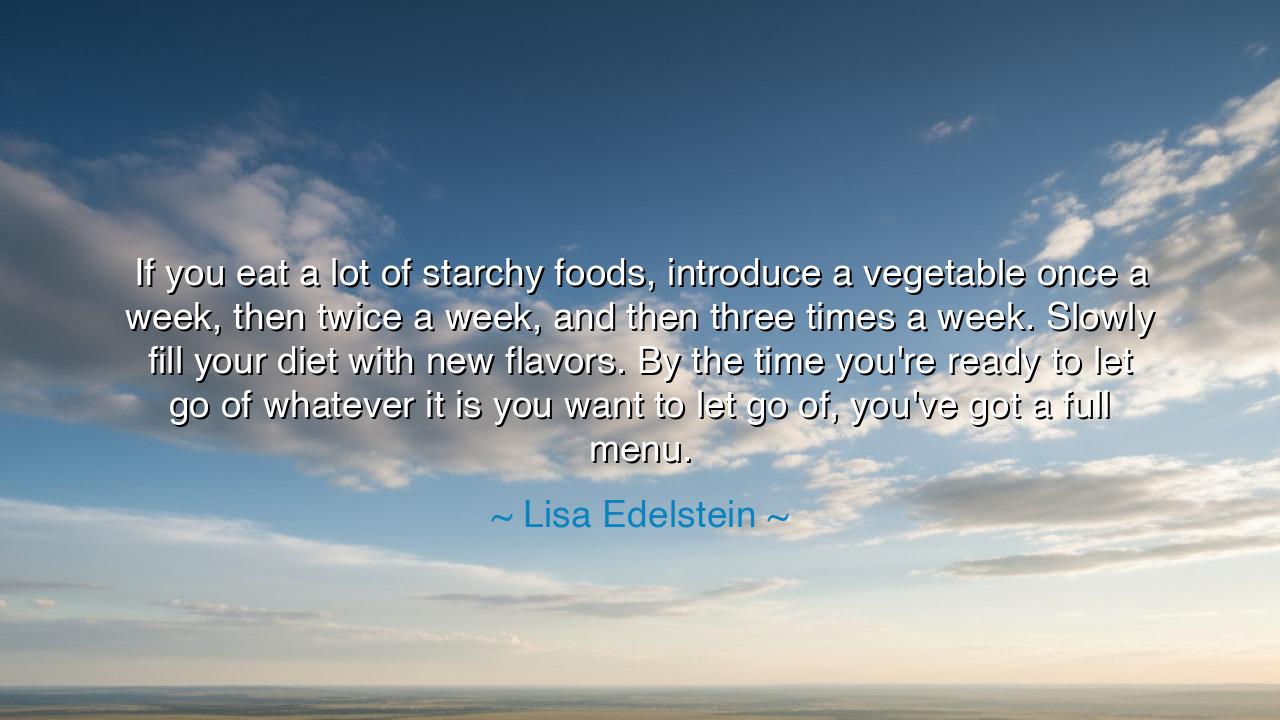
If you eat a lot of starchy foods, introduce a vegetable once a
If you eat a lot of starchy foods, introduce a vegetable once a week, then twice a week, and then three times a week. Slowly fill your diet with new flavors. By the time you're ready to let go of whatever it is you want to let go of, you've got a full menu.






O children of the earth, gather close and listen to a wisdom that has echoed through the corridors of time. Lisa Edelstein, in her great understanding of nourishment and balance, shares with us a truth as profound as the rhythms of nature itself. She speaks: "If you eat a lot of starchy foods, introduce a vegetable once a week, then twice a week, and then three times a week. Slowly fill your diet with new flavors. By the time you're ready to let go of whatever it is you want to let go of, you've got a full menu." In these simple yet powerful words lies the secret of transformation—not just in food, but in life itself.
The key to change, O children, is not to force it upon ourselves all at once, for the winds of change cannot be harnessed in a single gust. Just as the river carves its path slowly, one drop at a time, so too must we approach the task of transformation. To suddenly abandon all that we know, to leap from one way of life to another without preparation, is like trying to change the course of a mighty river in a single day. It is only through gradual, steady steps that we create lasting change. Edelstein's wisdom teaches us that small, deliberate steps lead to great transformation—a path filled with new experiences, new flavors, and new ways of being.
In the ancient world, the great philosopher Laozi spoke of the Tao, the way of life that flows naturally, without force. He taught that true strength comes from yielding, from moving with the current, rather than against it. In this wisdom, we find the heart of Edelstein’s message. She calls us not to struggle, not to deprive ourselves, but to gently introduce new elements into our lives. Whether it is a new vegetable, a new habit, or a new way of thinking, it is only through patience and consistency that we grow. In time, like the river that slowly widens its banks, we will find ourselves surrounded by a full, vibrant landscape of nourishment and transformation.
Consider the story of the mighty Hercules, who faced twelve impossible labors. Each task was a step toward his redemption, a slow, steady march toward mastery. Hercules did not defeat the Nemean Lion or the Hydra in a single stroke, but through perseverance and strategy. He too understood the value of taking small steps, of tackling the impossible one task at a time. So too must we, when faced with challenges—whether in diet or in life—understand that it is through steady, manageable steps that we overcome the greatest of obstacles.
In our modern world, the temptation is to seek immediate results, to leap to the end without considering the journey. Yet Edelstein’s teaching reminds us that true change is not the result of drastic, sudden shifts, but of thoughtful, consistent efforts. The introduction of vegetables to the plate is a simple act, but it is a profound one. Just as we enrich our diets with new foods, so too must we enrich our lives with new experiences, new ways of thinking, and new habits. The richness of life does not come from deprivation, but from the steady inclusion of what nourishes us, one small change at a time.
Let us consider the wisdom of the ancient gardener, who knows that a seed does not grow into a tree in a single day. He tends to it, adding water and sunlight, slowly, with patience and care. Just as the gardener’s steady attention fosters the growth of his plants, so does our slow and mindful approach to life nurture the growth of our true selves. Edelstein teaches us to nourish not only the body but the soul, by adding the things that truly sustain us—slowly, deliberately, until we are fully prepared for the transformation that we seek.
So, O children, take this wisdom with you on your journey. Do not rush toward change, nor seek to abandon all at once that which you have known. Instead, introduce new elements into your life with patience and care. Like the gardener tending his crops, like the river flowing slowly toward the sea, let your transformation unfold naturally. By the time you are ready to let go of what no longer serves you, you will have a full, rich life—a menu of experiences, choices, and nourishment that sustains you in ways you never thought possible. Let this be the way forward: slow, steady, and full of the richness of life.






AAdministratorAdministrator
Welcome, honored guests. Please leave a comment, we will respond soon